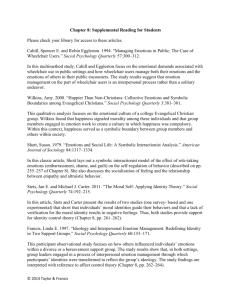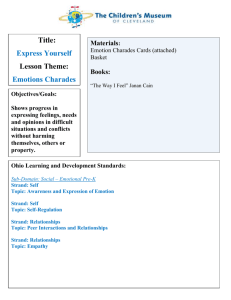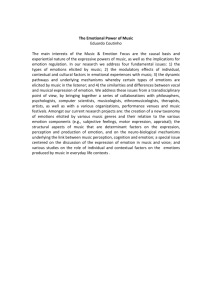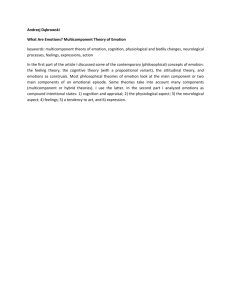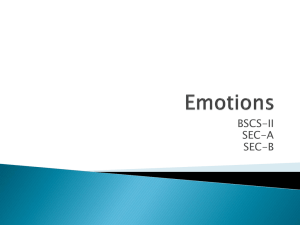Belikova Yu.V. THE CONCEPTUAL FRAMEWORK OF EMOTIONAL
advertisement
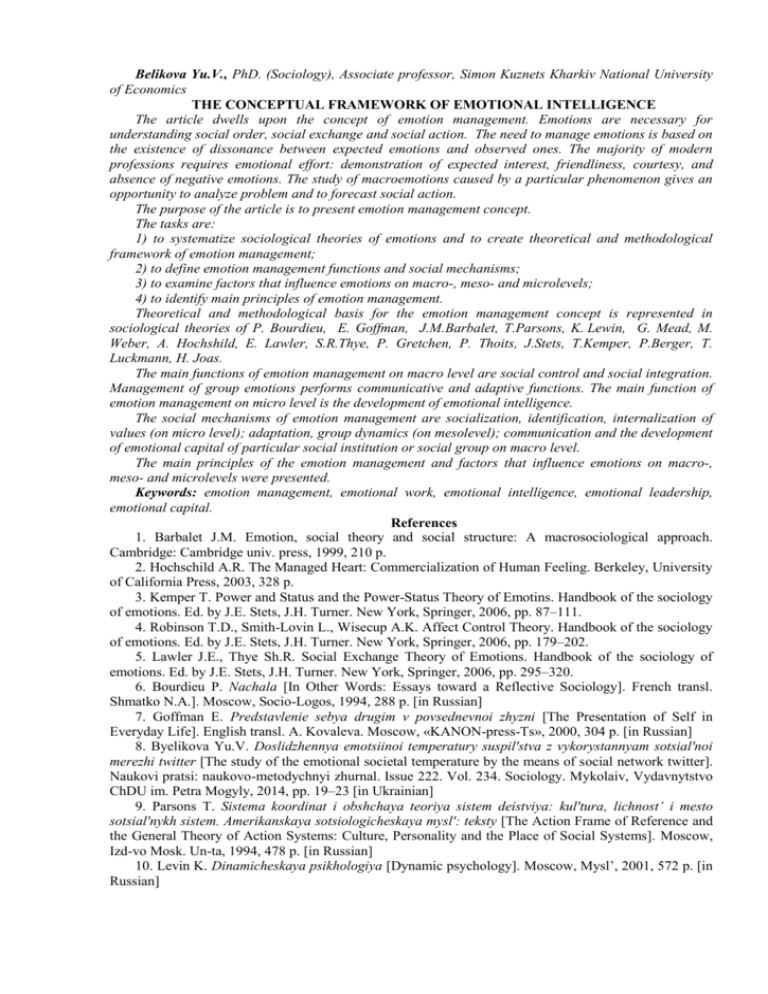
Belikova Yu.V., PhD. (Sociology), Associate professor, Simon Kuznets Kharkiv National University of Economics THE CONCEPTUAL FRAMEWORK OF EMOTIONAL INTELLIGENCE The article dwells upon the concept of emotion management. Emotions are necessary for understanding social order, social exchange and social action. The need to manage emotions is based on the existence of dissonance between expected emotions and observed ones. The majority of modern professions requires emotional effort: demonstration of expected interest, friendliness, courtesy, and absence of negative emotions. The study of macroemotions caused by a particular phenomenon gives an opportunity to analyze problem and to forecast social action. The purpose of the article is to present emotion management concept. The tasks are: 1) to systematize sociological theories of emotions and to create theoretical and methodological framework of emotion management; 2) to define emotion management functions and social mechanisms; 3) to examine factors that influence emotions on macro-, meso- and microlevels; 4) to identify main principles of emotion management. Theoretical and methodological basis for the emotion management concept is represented in sociological theories of P. Bourdieu, E. Goffman, J.M.Barbalet, T.Parsons, K. Lewin, G. Mead, M. Weber, A. Hochshild, E. Lawler, S.R.Thye, P. Gretchen, P. Thoits, J.Stets, T.Kemper, P.Berger, T. Luckmann, H. Joas. The main functions of emotion management on macro level are social control and social integration. Management of group emotions performs communicative and adaptive functions. The main function of emotion management on micro level is the development of emotional intelligence. The social mechanisms of emotion management are socialization, identification, internalization of values (on micro level); adaptation, group dynamics (on mesolevel); communication and the development of emotional capital of particular social institution or social group on macro level. The main principles of the emotion management and factors that influence emotions on macro-, meso- and microlevels were presented. Keywords: emotion management, emotional work, emotional intelligence, emotional leadership, emotional capital. References 1. Barbalet J.M. Emotion, social theory and social structure: A macrosociological approach. Cambridge: Cambridge univ. press, 1999, 210 p. 2. Hochschild A.R. The Managed Heart: Commercialization of Human Feeling. Berkeley, University of California Press, 2003, 328 p. 3. Kemper T. Power and Status and the Power-Status Theory of Emotins. Handbook of the sociology of emotions. Ed. by J.E. Stets, J.H. Turner. New York, Springer, 2006, pp. 87–111. 4. Robinson T.D., Smith-Lovin L., Wisecup A.K. Affect Control Theory. Handbook of the sociology of emotions. Ed. by J.E. Stets, J.H. Turner. New York, Springer, 2006, pp. 179–202. 5. Lawler J.E., Thye Sh.R. Social Exchange Theory of Emotions. Handbook of the sociology of emotions. Ed. by J.E. Stets, J.H. Turner. New York, Springer, 2006, pp. 295–320. 6. Bourdieu P. Nachala [In Other Words: Essays toward a Reflective Sociology]. French transl. Shmatko N.A.]. Moscow, Socio-Logos, 1994, 288 p. [in Russian] 7. Goffman E. Predstavlenie sebya drugim v povsednevnoi zhyzni [The Presentation of Self in Everyday Life]. English transl. A. Kovaleva. Moscow, «KANON-press-Ts», 2000, 304 p. [in Russian] 8. Byelikova Yu.V. Doslidzhennya emotsiinoi temperatury suspil'stva z vykorystannyam sotsial'noi merezhi twitter [The study of the emotional societal temperature by the means of social network twitter]. Naukovi pratsi: naukovo-metodychnyi zhurnal. Issue 222. Vol. 234. Sociology. Mykolaiv, Vydavnytstvo ChDU im. Petra Mogyly, 2014, pp. 19–23 [in Ukrainian] 9. Parsons T. Sistema koordinat i obshchaya teoriya sistem deistviya: kul'tura, lichnost’ i mesto sotsial'nykh sistem. Amerikanskaya sotsiologicheskaya mysl': teksty [The Action Frame of Reference and the General Theory of Action Systems: Culture, Personality and the Place of Social Systems]. Moscow, Izd-vo Mosk. Un-ta, 1994, 478 p. [in Russian] 10. Levin K. Dinamicheskaya psikhologiya [Dynamic psychology]. Moscow, Mysl’, 2001, 572 p. [in Russian] 11. Mead G. Ot zhesta k simvolu. Amerikanskaya sotsiologicheskaya mysl': teksty. Pod red. V.Y. Dobren'kova [From gesture to symbol. American sociological thought: texts. Ed. V.I. Dobren’kov]. Moscow, Izd-vo MGU, 1994, 496 p. [in Russian] 12. Byelikova Yu.V. Mozhlyvosti sotsiometrii u vyvchenni grupovykh emotsiy [The possibility of sociometry in the study of group emotions]. Naukovi pratsi: naukovo-metodychnyi zhurnal. Issue 144. Vol. 156. Sociology. Mykolaiv, Vyd-vo ChDU im. Petra Mogyly, 2011, pp. 6–9 [in Ukrainian] 13. Ridgeway L.C. Expectation States Theory and Emotions. Handbook of the sociology of emotions. Ed. by J.E. Stets, J.H. Turner. New York, Springer, 2006, pp. 347–367. 14. Kemper T. Research agendas in the sociology of emotions. New York, SUNY Press, 1990, 336 p. 15. Joas H. Kreativnost' deistviya [Creativity of action]. Per. s nem. St.-Petersburg, Aleteiya, 2005, 320 p. [in Russian] 16. Byelikova Yu.V. Emotsii i pochuttya: sotsiologichnyi analiz. Typizatsiya grupovykh emotsiy [Emotions and feelings: a sociological analysis. Typology of group emotions]. Visnyk Odes'kogo natsional'nogo universytetu. Sotsiologiya, politychni nauky. Odesa, 2011, pp. 168–173 [in Ukrainian] 17. Hedstom P., Swedberg R. Social Mechanisms. An Analytical Approach to Social Theory. Cambridge, Univ. Press, 1998, pp. 6–33. 18. Byelikova Yu.V. «Emotsiina logika»: genderna spetsyfika sotsial'noi dii [«Emotional logic»: gender specificity of social action]. Ukrains’kyi sotsium – Ukrainian society, 2011, No. 4 (39), pp. 31–39 [in Ukrainian]



